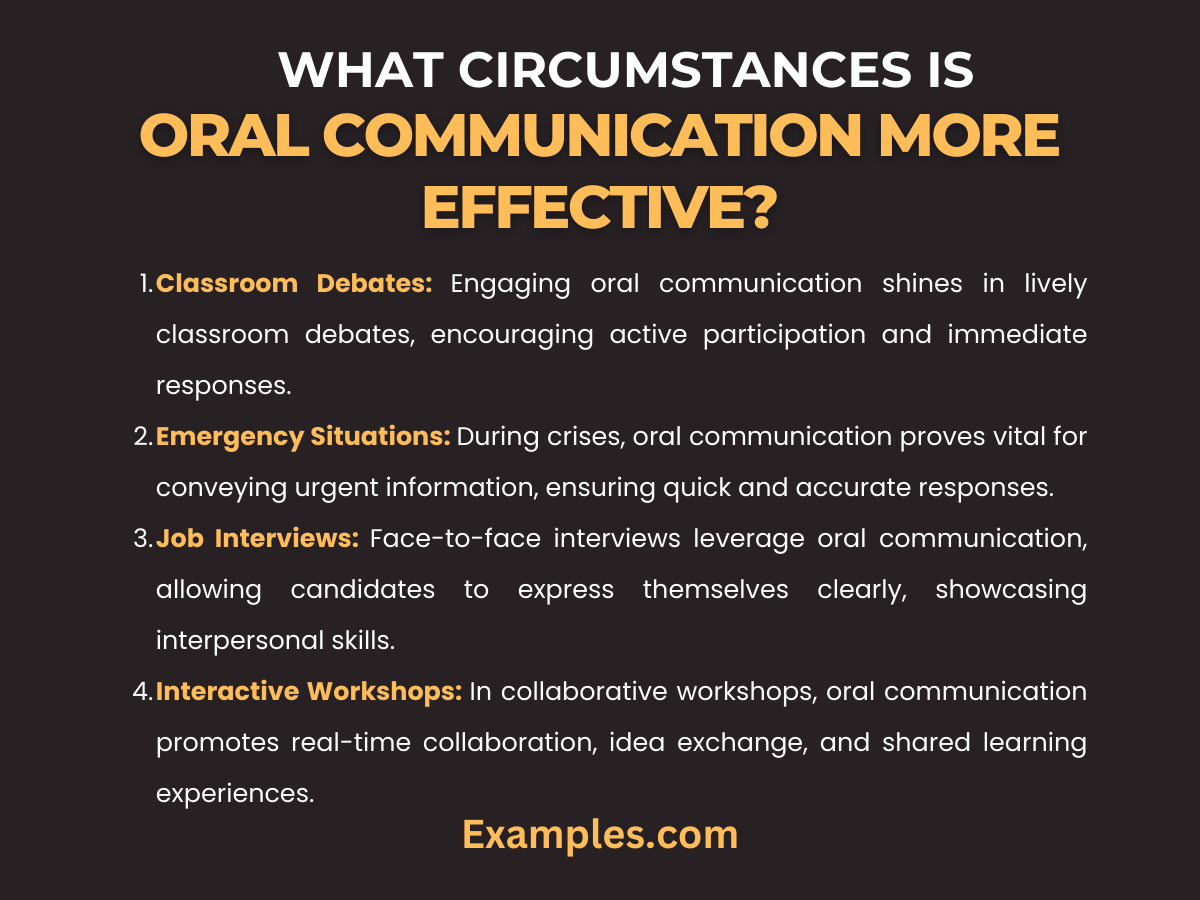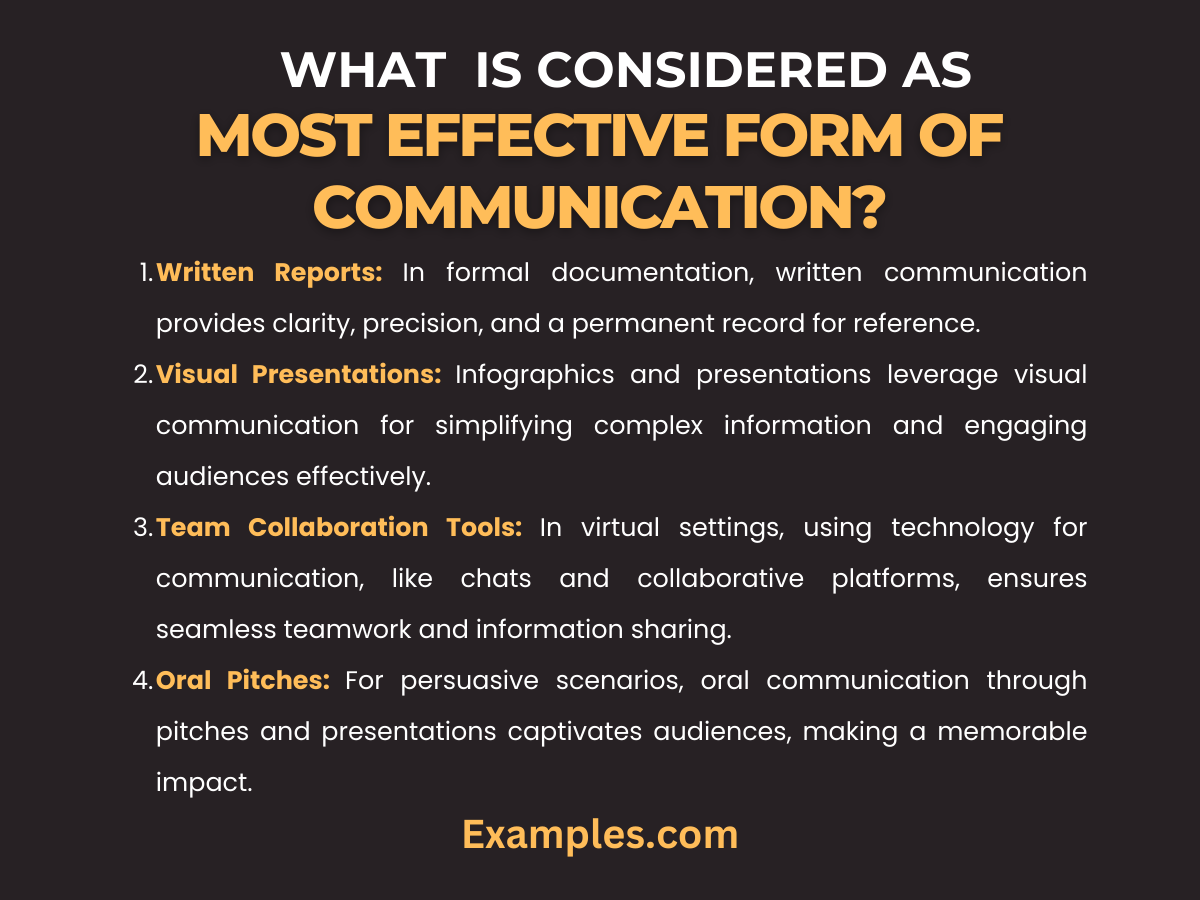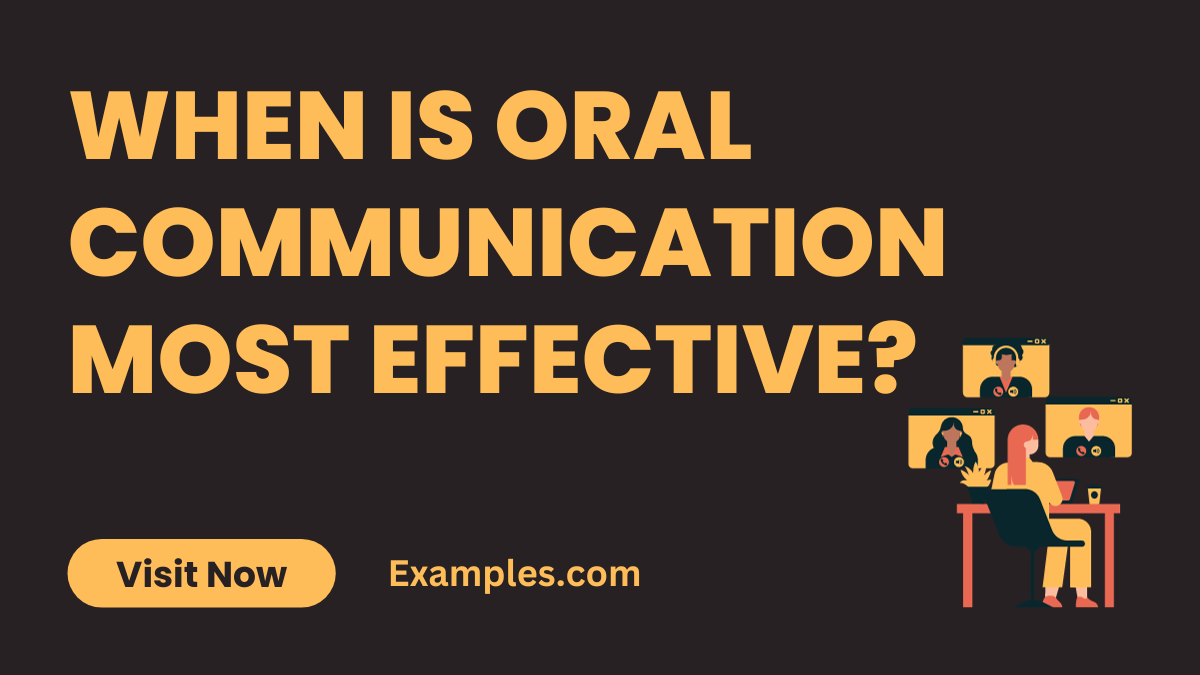When is Oral Communication Most Effective?
Unlock the secrets of optimum communication effectiveness with our guide on “When is Oral Communication Most Effective?” Dive into scenarios where oral communication thrives, exploring Communication Examples that bring theory to life. From the classroom to the workplace, discover the strategic timings, styles, and tips that transform everyday conversations into impactful and meaningful exchanges. Elevate your communication skills and leave a lasting impression in any context.
Under What Circumstance Is Oral Communication More Effective?
Oral communication thrives in dynamic circumstances where immediate interaction is crucial. In face-to-face meetings, classroom discussions, or crisis scenarios, oral communication excels. It enables real-time feedback, clarifications, and emotional nuances, fostering a deeper understanding. Explore these scenarios to harness the power of spoken words.

- Classroom Debates: Engaging oral communication shines in lively classroom debates, encouraging active participation and immediate responses.
- Emergency Situations: During crises, oral communication proves vital for conveying urgent information, ensuring quick and accurate responses.
- Job Interviews: Face-to-face interviews leverage oral communication, allowing candidates to express themselves clearly, showcasing interpersonal skills.
- Interactive Workshops: In collaborative workshops, oral communication promotes real-time collaboration, idea exchange, and shared learning experiences.
What Is Considered the Most Effective Form of Communication?
The most effective form of communication often hinges on the context and goals. While oral communication is powerful in many scenarios, the written form holds sway in documentation and precision. Visual communication, using images and graphs, enhances understanding. A blend of these forms, considering the situation, ensures comprehensive and impactful communication strategies.

- Written Reports: In formal documentation, written communication provides clarity, precision, and a permanent record for reference.
- Visual Presentations: Infographics and presentations leverage visual communication for simplifying complex information and engaging audiences effectively.
- Team Collaboration Tools: In virtual settings, using technology for communication, like chats and collaborative platforms, ensures seamless teamwork and information sharing.
- Oral Pitches: For persuasive scenarios, oral communication through pitches and presentations captivates audiences, making a memorable impact.
What are the Three Factors Affecting Oral Communication
- Clarity of Expression: The ability to articulate thoughts clearly significantly influences effective oral communication. Clarity reduces misunderstandings and ensures the intended message is received accurately.
- Active Listening Skills: Successful oral communication hinges on active listening. Both the speaker and the listener play crucial roles, with attentive listening fostering understanding and promoting effective dialogue.
- Context and Environment: The surroundings and context greatly impact oral communication. Factors like noise level, distractions, and the formality of the setting influence how effectively messages are conveyed and received.
What are the Five Principles of Effective Oral Communication
- Clear Articulation: Express thoughts coherently, ensuring the audience comprehends the message without ambiguity.
- Active Engagement: Foster interaction and engagement through open-ended questions, encouraging a participative exchange of ideas.
- Adaptability: Tailor communication to suit the audience and context, adjusting tone, language, and style accordingly.
- Nonverbal Cues: Leverage nonverbal cues such as body language and facial expressions to enhance and emphasize spoken words.
- Feedback Integration: Solicit and incorporate feedback during communication, promoting a dynamic and responsive dialogue that ensures mutual understanding.
When is Oral Communication Most Effective?
Oral communication effectiveness hinges on various factors that influence the clarity and impact of your message. Explore the three critical elements shaping successful oral communication.
- Clarity of Expression: The articulation and expression of ideas play a pivotal role. A clear and concise delivery ensures the audience grasps the intended message, minimizing the risk of miscommunication.
- Active Listening: Effective oral communication involves not just speaking but listening attentively. The ability to understand and respond thoughtfully enhances the overall quality of interactions.
- Contextual Adaptability: Adapting communication styles based on the context and audience is crucial. Whether in a classroom or workplace, tailoring your approach ensures relevance and receptivity.
Understanding and honing these factors will significantly contribute to the effectiveness of oral communication in various settings.
Unlocking Impactful Communication: The 5 Principles of Effective Oral Communication
Mastering the principles of effective oral communication empowers individuals to convey messages with influence and resonance. Explore the five fundamental principles that elevate oral communication to an art form.
- Clarity and Conciseness: Clearly articulate thoughts, avoiding unnecessary complexity. Conciseness ensures a focused message, enhancing audience understanding.
- Engagement and Connection: Forge a connection with your audience through engaging delivery. Utilize storytelling, relatable examples, and interactive elements to captivate and connect.
- Adaptability and Flexibility: Effective communicators adapt to diverse situations and audiences. Flexibility in tone, pace, and style ensures messages resonate with various listeners.
- Empathy and Understanding: Acknowledge the emotions and perspectives of your audience. An empathetic approach fosters a positive environment, facilitating meaningful exchanges.
- Feedback Integration: Solicit and incorporate feedback actively. An iterative process of communication allows for refinement, ensuring continual improvement and effectiveness.
In conclusion, Oral communication is an essential skill that significantly impacts our personal and professional lives. Recognizing when and how to utilize oral communication effectively can dramatically enhance the clarity and effectiveness of our interactions. For those looking to improve their oral communication skills, especially in professional contexts, Toastmasters International provides a wealth of resources. Their tips on public speaking, handling nervousness, and engaging an audience are invaluable for anyone aiming to refine their speaking abilities.
Additionally, the digital age has transformed the landscape of communication, making it vital to adapt oral communication skills for online environments. Websites like MindTools, which offer comprehensive guides on effective communication in the workplace, including virtual communication, are great resources. Their strategies for clear and concise messaging, active listening, and adapting to different communication styles can help individuals navigate both in-person and digital interactions more effectively. By leveraging these resources, anyone can enhance their oral communication skills to become more effective and confident communicators in various settings.



